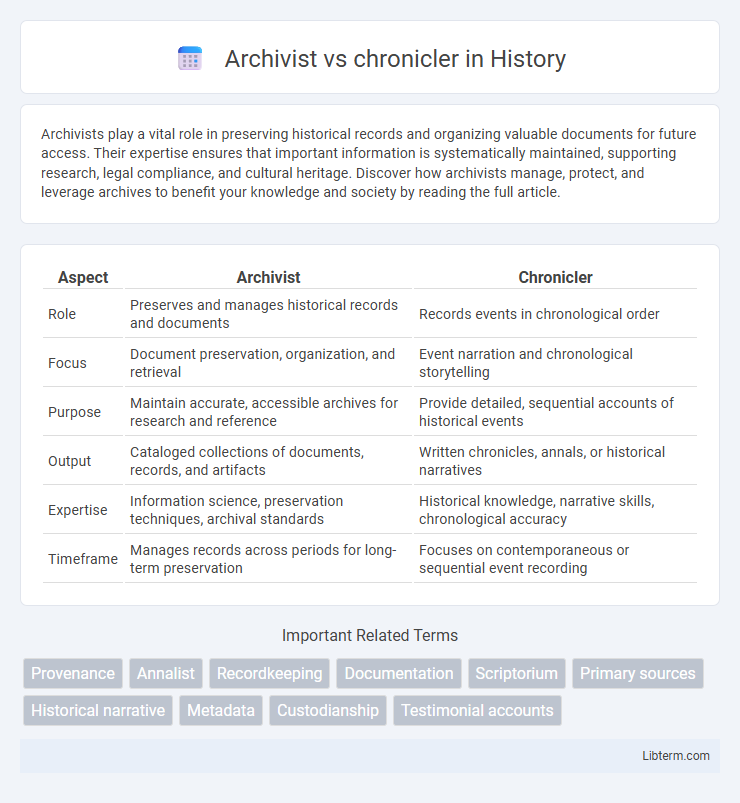Archivists play a vital role in preserving historical records and organizing valuable documents for future access. Their expertise ensures that important information is systematically maintained, supporting research, legal compliance, and cultural heritage. Discover how archivists manage, protect, and leverage archives to benefit your knowledge and society by reading the full article.
Table of Comparison
| Aspect | Archivist | Chronicler |
|---|---|---|
| Role | Preserves and manages historical records and documents | Records events in chronological order |
| Focus | Document preservation, organization, and retrieval | Event narration and chronological storytelling |
| Purpose | Maintain accurate, accessible archives for research and reference | Provide detailed, sequential accounts of historical events |
| Output | Cataloged collections of documents, records, and artifacts | Written chronicles, annals, or historical narratives |
| Expertise | Information science, preservation techniques, archival standards | Historical knowledge, narrative skills, chronological accuracy |
| Timeframe | Manages records across periods for long-term preservation | Focuses on contemporaneous or sequential event recording |
Understanding the Roles: Archivist vs Chronicler
Archivists specialize in preserving, organizing, and safeguarding historical documents and records to ensure their authenticity and accessibility for future research. Chroniclers focus on narrating events in chronological order, often providing detailed accounts and interpretations to capture the context and significance of those events. Understanding the distinct roles highlights archivists as custodians of original materials, while chroniclers act as storytellers who document history through comprehensive narratives.
Key Responsibilities of an Archivist
Archivists are responsible for acquiring, organizing, preserving, and managing historical records and documents to ensure their long-term accessibility. They evaluate materials for retention, implement archival standards, and maintain metadata for efficient retrieval and contextual understanding. Archivists collaborate with researchers and institutions to support information dissemination while protecting sensitive or confidential data.
Primary Functions of a Chronicler
A chronicler's primary function involves documenting events in a detailed, chronological narrative to preserve history with contextual storytelling. Unlike an archivist who organizes, preserves, and manages historical records and documents, a chronicler actively interprets and records occurrences, often weaving personal observations and cultural significance into the historical account. This role requires both accuracy and narrative skill to create a comprehensive historical record that informs future generations.
Skills Required: Archivist vs Chronicler
Archivists require expertise in information management, cataloging, and preservation techniques to ensure the integrity and accessibility of historical records. Chroniclers focus on narrative skills, keen observation, and accurate documentation to create detailed and engaging accounts of events. Both roles demand strong research abilities, attention to detail, and proficiency in digital tools for record-keeping and storytelling.
Documentation Methods and Approaches
Archivists employ systematic methods to collect, preserve, and organize primary source materials, focusing on provenance and original order to maintain the authenticity and context of records. Chroniclers utilize narrative-driven approaches, recording events sequentially with emphasis on storytelling and contextual interpretation, often blending factual data with personal or cultural perspectives. Both documentation methods serve crucial roles in historical preservation, with archivists prioritizing accuracy and permanence, while chroniclers emphasize comprehensive, accessible accounts.
Historical Value: Preservation vs Narrative
Archivists prioritize the preservation of original documents and artifacts to maintain the authenticity and integrity of historical records for future research. Chroniclers focus on creating detailed narratives that interpret and contextualize events, providing a storyline that helps readers understand historical significance. While archivists safeguard primary sources, chroniclers shape the collective memory by weaving these sources into coherent accounts.
Tools and Technologies Utilized
Archivists primarily utilize digital databases, optical character recognition (OCR) software, and metadata management systems to organize and preserve historical documents efficiently. Chroniclers often rely on digital writing tools, content management systems, and multimedia recording devices to document and narrate events with real-time updates. Both professionals increasingly integrate cloud storage solutions and data analytics platforms to enhance accessibility and detailed contextualization of information.
Impact on Historical Research
Archivists systematically preserve and organize primary source materials, ensuring long-term accessibility and authenticity for historical research, while chroniclers create narrative accounts that provide context and interpretation of events. The archivist's role directly impacts the availability and reliability of original documents, facilitating scholarly analysis and evidence-based conclusions. Chroniclers influence historical research by shaping perspectives through their storytelling, often highlighting cultural and societal nuances that raw data alone may not convey.
Ethical Considerations and Challenges
Archivists face ethical considerations involving the preservation of authentic records while ensuring privacy and access rights, managing sensitive information with confidentiality. Chroniclers confront challenges in maintaining objectivity and accuracy without imposing personal bias or altering historical narratives. Both roles require adherence to professional codes and balancing transparency with respect for individual and collective memory.
Choosing the Right Profession: Archivist or Chronicler
Choosing between an archivist and a chronicler hinges on your passion for managing historical records or narrating events. Archivists specialize in preserving, organizing, and safeguarding documents and artifacts, utilizing digital databases and metadata standards to ensure long-term accessibility. Chroniclers focus on storytelling, recording contemporary events and cultural narratives with a focus on context and interpretation, often contributing to historical literature and media.
Archivist Infographic

 libterm.com
libterm.com